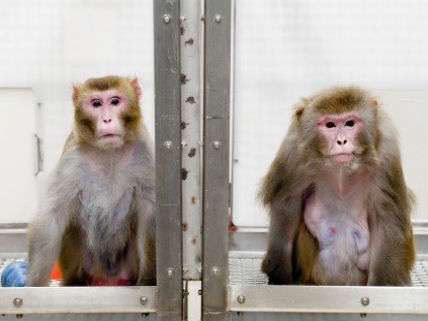Good News: Research Confirms Way to Boost Healthy Longevity
Bad news: Most of us have got to eat less to live longer

Researchers have shown time and again that calorie restriction increases healthy longevity in all sorts of creatures, including yeast, flies, and mice. Spurred by these findings, some folks dedicated to living as long as possible have adopted calorie restriction as way of life and research shows that it does result in improvements in all kinds of biomarkers associated with longevity. But will it really work in already long-lived mammals like humans? Two research groups - the Wisconsin National Primate Center and the National Institute on Aging (NIA) - have been feeding and following the health and survival status of two different colonies of rhesus monkeys for more than 30 years. In each, half of the monkeys ate as much as they wanted while the other half was fed a diet that was about 30 percent lower in calories.
Four years ago, the NIA researchers reported preliminary findings that calorie restriction did improve the health of monkeys, but not their longevity. However, the Wisconsin researchers reported that calorie restriction did improve survival rates. So what is going on? Today, in Nature Communications, the research from both groups is pooled and further analysis does find that calorie restriction does, indeed, boost both health and longevity in monkeys. It turns out that differences in the design of the two experiments are responsible for the differing results with regard to monkey longevity.
First, the NIA group initiated calorie restriction when its monkeys were young whereas the Wisconsin researchers waited until theirs were full-grown adults. It now turns out that eating less is beneficial for adult monkeys but not for younger ones. Second, the NIA control monkeys actually ate less than the Wisconsin control monkeys, as a result the NIA control monkeys lived longer than the Wisconsin control monkeys. And third, while the diets of both groups of monkeys had similar calorie density, compared to the Wisconsin diet, the NIA diet was lower in fat, higher in protein and higher in fiber. In addition, both groups' diets contained?60% carbohydrates, but sucrose* comprised less than 7 percent of total carbohydrates at NIA and 45 percent of total carbohydrates at Wisconsin. Diets at both locations were replete for vitamins that were provided at or above the recommended daily allowance. As the press release from the University of Wisconsin-Madison noted, the Wisconsin control animals were fatter than the control monkeys at NIA, indicating that at nonrestricted levels of food intake, what is eaten can make a big difference for fat mass and body composition.*
Longevity figures in the studies are not complete since many of the monkeys are still alive, but Wisconsin researchers calculate that the median survival rate for calorie restricted male and female monkeys is ?28 and ?30 years of age respectively compared to 26 years for control monkeys. The researchers also report that calorie-restricted monkeys experience less cardiovascular disease, cancer, arthritis, muscle-wasting, and diabetes.
"In conclusion, the NIA and UW nonhuman primate ageing and CR studies address a central concept of relevance to human ageing and human health: that the age-related increase in disease vulnerability in primates is malleable and that ageing itself presents a reasonable target for intervention," note the researchers. "Processes impacted by CR would be prime targets for the development of clinical interventions to offset age-related morbidity, and identification of factors involved in the mechanisms of CR will be pivotal in bringing these ideas to clinical research and human health care."
*It seems appropriate to mention my review of The Case Against Sugar here considering that its author Gary Taubes argues persuasively that high levels of sugar consumption are especially harmful to health.
